I needed a bit of time to process that one.
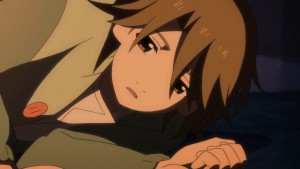 It’s funny – as soon as the cold open for this episode kicked in, there was a buzz about it, a tension in the air. It wasn’t immediately clear from the plot that monumental events would be taking place, but somehow you knew something big was going on. I can’t fully explain it, but the closest comparison I can make with the viewing experience is to a “fight or flight” reaction – that heightened sense of awareness and anxiety when you’ve sensed that danger is present.
It’s funny – as soon as the cold open for this episode kicked in, there was a buzz about it, a tension in the air. It wasn’t immediately clear from the plot that monumental events would be taking place, but somehow you knew something big was going on. I can’t fully explain it, but the closest comparison I can make with the viewing experience is to a “fight or flight” reaction – that heightened sense of awareness and anxiety when you’ve sensed that danger is present.
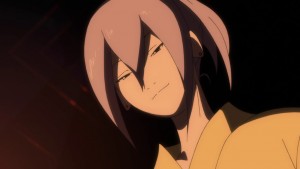 The truth is, Uchouten Kazoku has always had another gear – the ability to lift its game to levels where other series rarely attempt to trade, never mind succeed. The most obvious example is the first season’s eighth episode, which was among the finest half-dozen or so anime episodes I’ve ever been privileged to watch. This one wasn’t on that level, but it was certainly the most riveting and heartbreaking of the season – and fittingly, both of these episodes dealt with the passing of a brother into the world of the dead.
The truth is, Uchouten Kazoku has always had another gear – the ability to lift its game to levels where other series rarely attempt to trade, never mind succeed. The most obvious example is the first season’s eighth episode, which was among the finest half-dozen or so anime episodes I’ve ever been privileged to watch. This one wasn’t on that level, but it was certainly the most riveting and heartbreaking of the season – and fittingly, both of these episodes dealt with the passing of a brother into the world of the dead.
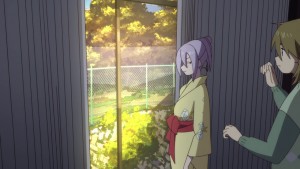 Mind you, even in it’s “regular” mode The Eccentric Family is nothing if not exceptional. It’s a beautiful production by P.A. Works, so utterly different from anything else in their catalog and an obvious labor of love. But the wellspring of that specialness is Morimi Tomihiko. He’s a writer of tremendous intelligence and intellectual curiosity (and no, those two are not the same). He bandies big ideas about in his works, and he never makes the answers easy for us to find because, clearly, the act of writing these stories is his way of looking for them himself. That’s why, while the way some elements of this series defy explanation sometimes vexes me, I accept them – the world we live in doesn’t always make sense, and doesn’t yield the big answers easily.
Mind you, even in it’s “regular” mode The Eccentric Family is nothing if not exceptional. It’s a beautiful production by P.A. Works, so utterly different from anything else in their catalog and an obvious labor of love. But the wellspring of that specialness is Morimi Tomihiko. He’s a writer of tremendous intelligence and intellectual curiosity (and no, those two are not the same). He bandies big ideas about in his works, and he never makes the answers easy for us to find because, clearly, the act of writing these stories is his way of looking for them himself. That’s why, while the way some elements of this series defy explanation sometimes vexes me, I accept them – the world we live in doesn’t always make sense, and doesn’t yield the big answers easily.
 The Friday Club is, in its essence, the ultimate paradoxical enigma of Uchouten Kazoku. Why do tanuki so readily accept the idea that they should be eaten in a hot pot for the pleasure of a social elite of humans and tengu? Why do seemingly intelligent and non-psychotic people think it’s all right to eat clearly intelligent and sensitive beings capable of human-level emotions? Why does Yasaburou love and admire a woman who was complicit in the murder and consumption of his beloved father? It’s not enough to simply say “tanuki aren’t people” – but that they are alien to us is something we, as viewers and readers, need to accept. While the feelings at the core of the Shimogamo family couldn’t be more elementally human, we can’t allow that to fool us into thinking they’re the same as we are. Yet we, as intelligent creatures, can’t simply accept what seems in irreconcilable behavior at face value. And that’s where I am with Uchouten Kazoku.
The Friday Club is, in its essence, the ultimate paradoxical enigma of Uchouten Kazoku. Why do tanuki so readily accept the idea that they should be eaten in a hot pot for the pleasure of a social elite of humans and tengu? Why do seemingly intelligent and non-psychotic people think it’s all right to eat clearly intelligent and sensitive beings capable of human-level emotions? Why does Yasaburou love and admire a woman who was complicit in the murder and consumption of his beloved father? It’s not enough to simply say “tanuki aren’t people” – but that they are alien to us is something we, as viewers and readers, need to accept. While the feelings at the core of the Shimogamo family couldn’t be more elementally human, we can’t allow that to fool us into thinking they’re the same as we are. Yet we, as intelligent creatures, can’t simply accept what seems in irreconcilable behavior at face value. And that’s where I am with Uchouten Kazoku.
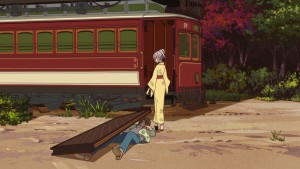 It’s certainly no surprise that Soun would be willing to consume tanuki in order to restore his social climber ambitions – he was willing to murder his own brother out of envy and resentment. But Yasaburou’s attitude is harder to reconcile. Good and evil are not fixed and easily identifiable constructs in Uchouten Kazoku – Benten (and the interpretation of her character) is ample evidence of that. All of the scenes leading up to the “reconciliation” banquet were magical and beautiful – the stroll down the path of bamboo, the underwater handshake, the arrival of Benten (let’s not forget that before the introduction of Western social mores, co-ed bathing was the norm in Japan), the steam rising off Yasaburou’s head as he leaves the baths. But through it all was that buzz, that sense of wrongness – something terrible was about to happen, that much was obvious.
It’s certainly no surprise that Soun would be willing to consume tanuki in order to restore his social climber ambitions – he was willing to murder his own brother out of envy and resentment. But Yasaburou’s attitude is harder to reconcile. Good and evil are not fixed and easily identifiable constructs in Uchouten Kazoku – Benten (and the interpretation of her character) is ample evidence of that. All of the scenes leading up to the “reconciliation” banquet were magical and beautiful – the stroll down the path of bamboo, the underwater handshake, the arrival of Benten (let’s not forget that before the introduction of Western social mores, co-ed bathing was the norm in Japan), the steam rising off Yasaburou’s head as he leaves the baths. But through it all was that buzz, that sense of wrongness – something terrible was about to happen, that much was obvious.
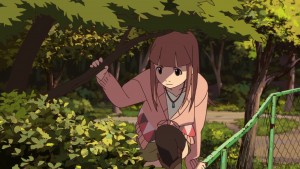 What happened at the banquet certainly bears discussion. Soun’s greed was transparent – it seemed transparent to me, also, that Juroujin and Benten were playing him, or at best humoring him. Poor, earnest Yadogawa-sensei’s rant – and Juroujin’s reaction – were sad and terrible, but what happened after is what demands contemplation. Why did Yasaburou do what he did – seemingly sell out his friend and his ideals? Speaking of transparent, I’m certain that he was doing it to save Yadogawa’s life. Even if Yasaburou believed the things he said (which I don’t think he does) he’d never forget that Yadogawa saved his mother’s life. In that moment, Yasaburou saw that breaking Yadogawa’s resolve was the only way to diffuse the situation without violence. He was both right and wrong, as subsequent events proved.
What happened at the banquet certainly bears discussion. Soun’s greed was transparent – it seemed transparent to me, also, that Juroujin and Benten were playing him, or at best humoring him. Poor, earnest Yadogawa-sensei’s rant – and Juroujin’s reaction – were sad and terrible, but what happened after is what demands contemplation. Why did Yasaburou do what he did – seemingly sell out his friend and his ideals? Speaking of transparent, I’m certain that he was doing it to save Yadogawa’s life. Even if Yasaburou believed the things he said (which I don’t think he does) he’d never forget that Yadogawa saved his mother’s life. In that moment, Yasaburou saw that breaking Yadogawa’s resolve was the only way to diffuse the situation without violence. He was both right and wrong, as subsequent events proved.
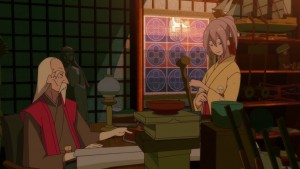 I don’t think Yasaburou wants the Hotei seat, and I think it was rather wicked of Benten (who is, in my view, a very wicked person indeed) to maneuver him into it. Soun’s reaction was predictable – he was in the end a small man, driven by small desires. But like many in this cast, I don’t see Soun as evil – just weak. Soun, Ginkaju and Kinkaju, Akadama-sensei, Yadogawa-sensei, Benten, even Yasaburou – everyone is hungering for something life isn’t giving them. They’re all aware of the ways they fall short of their own expectations (and those of others) and it makes them unhappy. And that unhappiness makes them do foolish and unkind things sometimes (some more than others, of course). I think that’s what made Souichirou so special and revered – he, more than anyone in this story (apart, perhaps, from his wife), seemed to be at peace with himself.
I don’t think Yasaburou wants the Hotei seat, and I think it was rather wicked of Benten (who is, in my view, a very wicked person indeed) to maneuver him into it. Soun’s reaction was predictable – he was in the end a small man, driven by small desires. But like many in this cast, I don’t see Soun as evil – just weak. Soun, Ginkaju and Kinkaju, Akadama-sensei, Yadogawa-sensei, Benten, even Yasaburou – everyone is hungering for something life isn’t giving them. They’re all aware of the ways they fall short of their own expectations (and those of others) and it makes them unhappy. And that unhappiness makes them do foolish and unkind things sometimes (some more than others, of course). I think that’s what made Souichirou so special and revered – he, more than anyone in this story (apart, perhaps, from his wife), seemed to be at peace with himself.
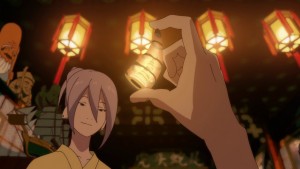 The death of Soun – a small, weak man responsible for much of the sadness in this story – should not itself have been as sad as it was. In the end he was just a furball, and one his children surely loved, even if they (certainly Kaisei) knew his weakness. Yasaburou’s agonized reaction to Soun’s final moments cut me to the bone, because it revealed so much about him. He took no joy from seeing his father “avenged” like this – all he saw was his uncle, all his tanuki artifice and ambition stripped away, slowly bleeding to death at the foot of a dead tree in a lush forest (a gorgeous image). This was a beautiful, terrible sadness just as Episode 8 was – but in this instance, in stark contrast to the first, the sadness sprung from all the unfulfilled promise and emptiness in the life of the brother who passed from the world of the living.
The death of Soun – a small, weak man responsible for much of the sadness in this story – should not itself have been as sad as it was. In the end he was just a furball, and one his children surely loved, even if they (certainly Kaisei) knew his weakness. Yasaburou’s agonized reaction to Soun’s final moments cut me to the bone, because it revealed so much about him. He took no joy from seeing his father “avenged” like this – all he saw was his uncle, all his tanuki artifice and ambition stripped away, slowly bleeding to death at the foot of a dead tree in a lush forest (a gorgeous image). This was a beautiful, terrible sadness just as Episode 8 was – but in this instance, in stark contrast to the first, the sadness sprung from all the unfulfilled promise and emptiness in the life of the brother who passed from the world of the living.



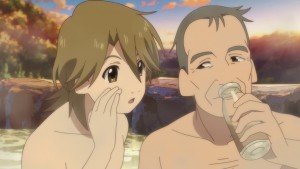
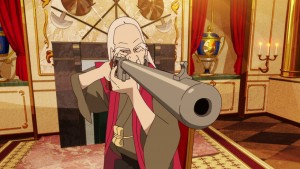
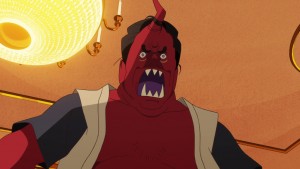
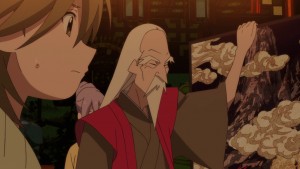
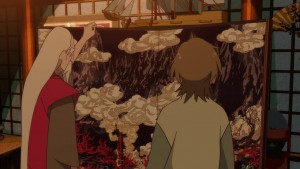
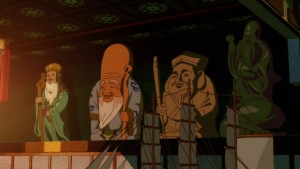
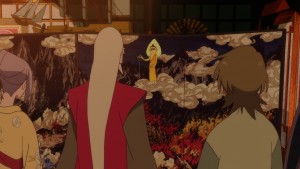

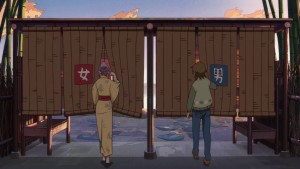
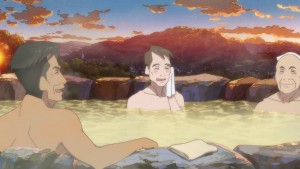
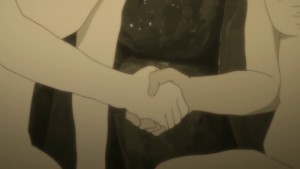
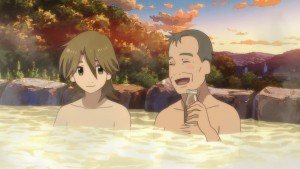
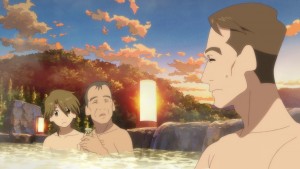
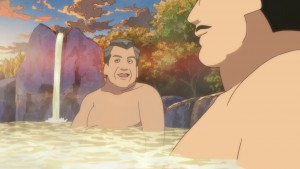
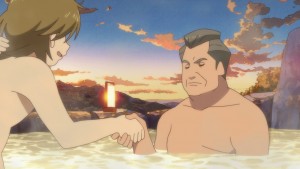
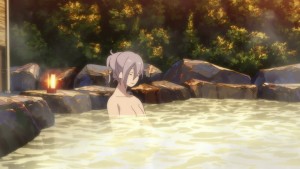
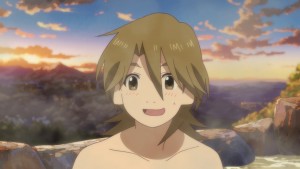
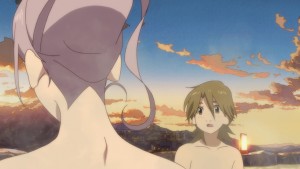
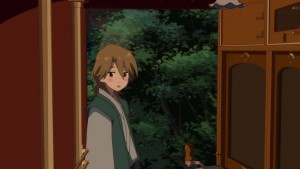
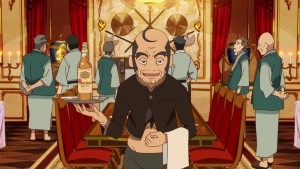
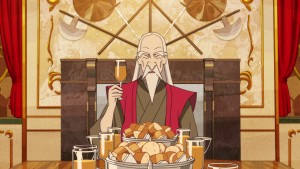
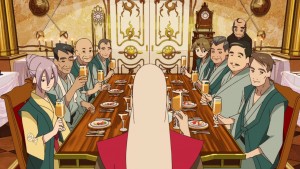
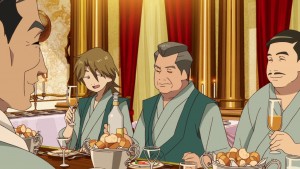

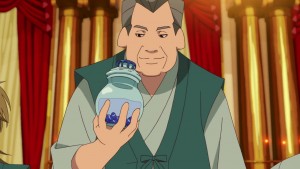
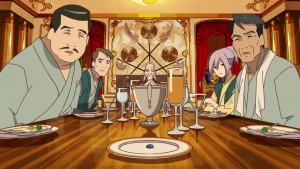
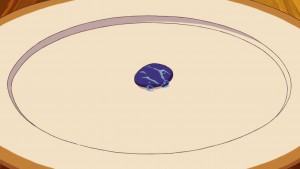
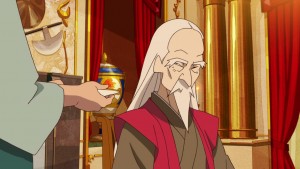
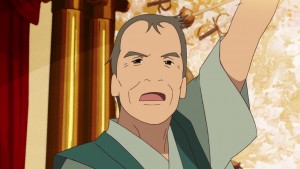

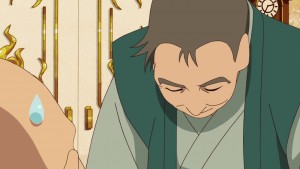
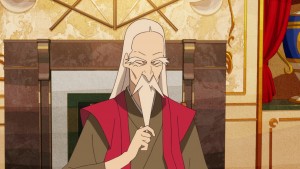
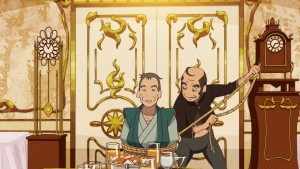
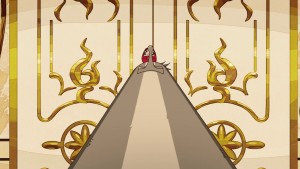
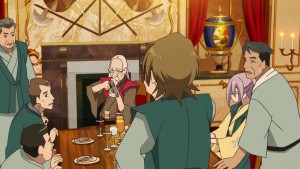
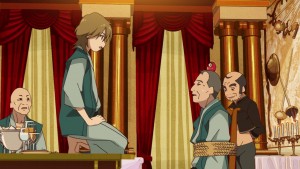
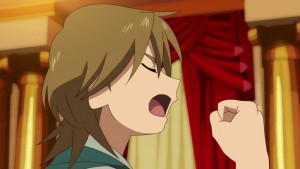
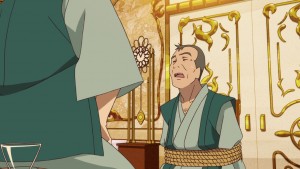
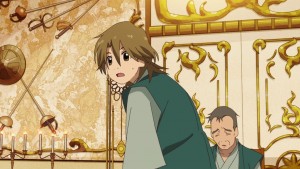
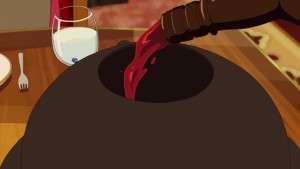
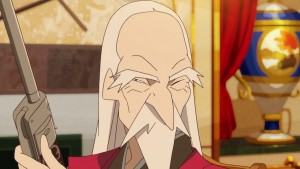

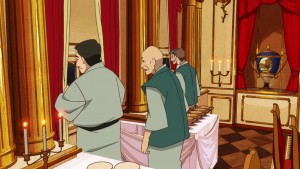
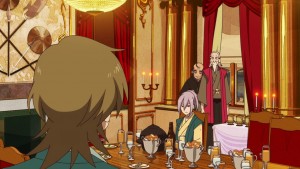
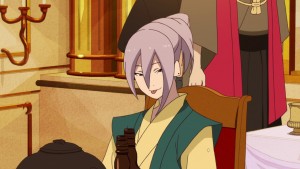
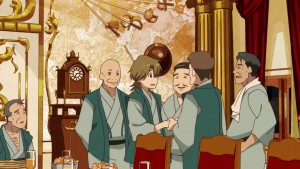
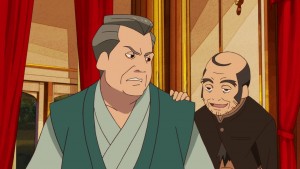
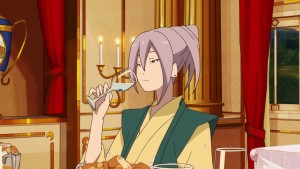
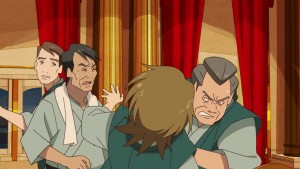
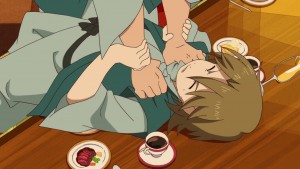
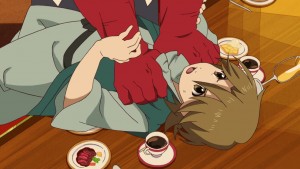
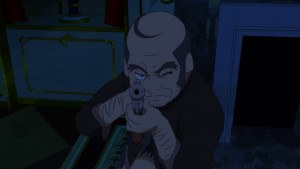
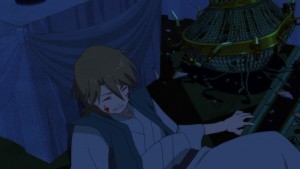
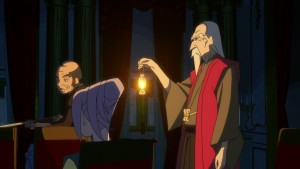
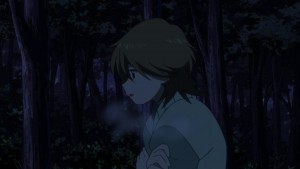
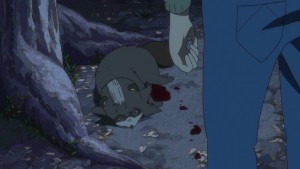
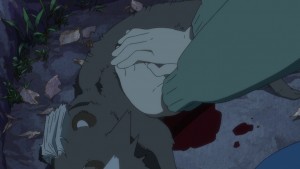
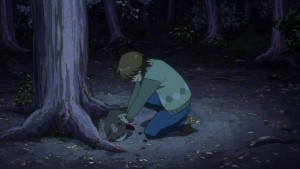

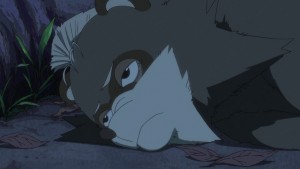
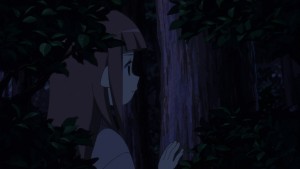
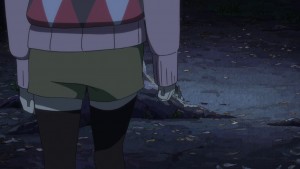
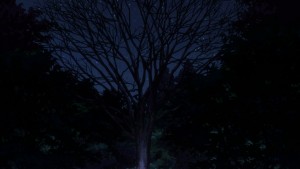


Flower
May 21, 2017 at 7:38 pmAyup … it is clear to me that this one was indeed packed with content for you. Rarely do I see posts where you are sorting things aloud as you type, but this one felt like that to me (even if you were not).
I also agree that Yasaburo was trying to defuse the situation with Yadagowa (who was indeed in danger, as we saw later on the head of the banquet certainly carries through on his threats or indignation), and I thought he very, very carefully phrased his speech in such a way that would not compromise what he truly felt but which would also be very easy to be misinterpreted by others. And I think Benten saw what he was doing and capriciously turned the tables on his head in a moment of horribly cruel genius to both tanuki involved.
And yes … I really do feel that many of those involved who come across as distasteful characters are more often weak, petty and small minded – Suon begin a very clear reference point for that with his death. I wonder if part of him knew it, too?
Anyhoo, good write up about the episode. 🙂
Guardian Enzo
May 21, 2017 at 8:16 pmThere’s a sad and beautiful symmetry to the death of the tanuki brothers. Souichirou’s death was a tragedy mourned by all because of all that he brought to the world. Soun’s death was a tragedy mourned by few because of all that he took away from the world, and all he failed to fulfil with his life.
ledto
May 21, 2017 at 9:36 pmReally good episode this week, I guess this episode is the author telling the audience its time to face the characters directly instead of just basing on impressions.
Regarding Benten action this week, I think she want to see what sort of route Yasaburou will take in the same position as her in the past and she hopes that Yasaburou will surprise her. In the past she probably wants to regain her human identity after the magic of tengu is over, she chose to be objective and eat Souichirou. She also hopes that through the action of eating tanuki, she can cut her ties to the fantasy world and rejoins the human society again.
For Yadogawa, he chose to be subjective and not eat tanuki when confront with the same situation. However, he ends up as self-destructive as shown in this episode. For Soun, he can’t break free from his tanuki identity in the end, notice how his hand trembled before he snapped and assaulted Yasaburou.
As for why Benten wants to see what path Yasaburou will take, I guess it is because after last episode Hell incident she probably feels that Yasaburou can adapt to any other identity. Benten feels attracted to Yasaburou as he is the only person that is willing to face her properly and actually tries to understand her. Another reason I guess is because she found some comfort in the “Ahou” way of living as demonstrated by Yasaburou. This whimsical way of living help her to alleviate her pain temporarily and she has done this numerous time throughout the story.
For Nidaime, Benten is probably jealous of his ability. Benten can try her best to improve but she can never win against a proper tengu IMHO. She is always stuck in a position which is more than human but less than tengu and this causes her identity issues. Another reason is possibly hatred for Nidaime. She probably feels that Nidaime forsaking his position as the successor causes the abduction event to happen and ruined the life of Suzuki Satomi.
To summarize, Benten is another complex character that generates a lot of hate and love from its viewers similar to the likes of Setsuna Ogiso from White Album 2 and Miyokichi from Shouwa Genroku Rakugo Shinjuu.
Asdfqwerty
May 22, 2017 at 3:24 amThe central theme of the first season is “what’s fun is good.” This episode really made clear to me the central theme of this season: empathy. Some themes present throughout the series that this episode also explores:
Heaven vs. Hell:
Beaten flies downward from heaven (seemingly) towards hell to escape hell.
“I have truly discovered that heaven is in the hot springs.”
-Yasaburo
“It’s not surprising for an Oni to appear. After all, hell lies right under these hot springs.”
-Jyurojin
“In the end, both heroes and villains are naught but furballs, and all furballs go to heaven.”
-Yasaburo
Worldliness yet unworldliness of humans:
This is perhaps the most explored theme in this series. Many humans (I’m counting tanuki and tengu as humans) do things that they shouldn’t be able to do, like painting a portrait of hell that actually sucks you to hell, or taking the moon from the sky. But at the same time, all these characters are normal, illogical, and flawed.
To some degree, this show deifies its characters. All of the members of the Friday club are named after gods. Yasaburo’s final message about how all “furballs” go to heaven also suggests that humans are grand and unworldly. This brings me to the next theme.
Empathy:
This show loves all of its characters, from the lovable main cast to the heartless (or at least what would usually be heartless in other shows) antagonists. It’s unusually empathetic towards the Friday club, who eats cute little tanuki. It dislikes how Hotei is trying to influence the Friday club with his warped sense of love. Heck, It even gave a sad moment towards one of the worst villains I’ve seen in anime.
No one deserves to die and those who do all go to heaven.
Logical yet illogical:
I still quite don’t get the discussion on love. It doesn’t quite make sense to me. Someone will have to explain it to me.
I love how there are times, like when he’s arguing with Yodogawa about love, where you can’t tell if Yasaburo is serious or not. It really adds to the “you don’t know what at the end, but that’s what makes it interesting.”
Just for the record, I initially thought the Soun death scene was the weakest part of episode 7. But then it was justified by the aphorism Yasaburo makes at the end.
Earthlingzing
May 22, 2017 at 9:18 amGreat writeup for a great episode. Uchouten Kazoku expresses itself in a way that’s really unique in any medium, that’s something that has stood out to me from the first episode. As for Benten, this episode more or less confirms the notion that she’s the one dragging Yasaburou into hell.
Guardian Enzo
May 22, 2017 at 9:54 amYou don’t get more archetypal femme fatale than that.
Matti
May 26, 2017 at 8:21 amFemme fatales are usually characters we like. Benten, imho, is plain unlikeable just deserves to die, as painfully as possible, preferably – like how one of those twins in that mediocre Blood-C series got ripped in two.
Guardian Enzo
May 26, 2017 at 9:05 am“Mediocre” amounts to exceptional generosity in this case, IMO.
Sennika
May 22, 2017 at 11:48 amNice screenshot collection, I may just give this one a go.
ThatLatinxChick
May 22, 2017 at 11:52 amThis episode made me comfortable, but I guess that was the point. I think that I need to accept that perhaps what are my own interpretations of morality might not be the same for the tanuki in the show. Its clear everyone involved has aspects of what we would consider human emotions, but its clear there is ambiguity both in their actions, how they view, and treat one another. Benten rubs me to wrong way, but ledto comment made me rethink her character and now while I still feel all kinds of way for her character I can at least sympathize with her.
Next week’s episode looks interesting to me because I have been wanting to know more about Kaisei character plus she is a personal favorite of mine.
dreamyklutz
May 23, 2017 at 5:15 amSorry if I’m wrong, but it sounded as if you were still trying to make sense of your feelings abt the episode when u were writing the recap haha. That said, I do find it a bit strange that the tanuki’s with all of their shape shifting abilities and access to magic are the lowest cast in the tengu-human-tanuki hierarchy. It’s kind of weird even with all of their (emotional) intelligence, they have such deep seated ‘we’re prey’ mindset that they almost seem indifferent being captured and eaten, but oh well. At this point, I’m not hoping for a deeper exploration of Benten. I haven’t been hoping for the show to reveal a ‘softer’ side about her, but just give me a Laura Moon kind of backstory to make her feel a bit less opaque and *mysterious*, but it is what it is. Yasaburo sure has grown up, I mean he has alway been a loyal, kind dude but *that* scene has really shown what Yasaburo is made of.